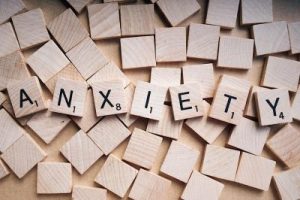An introduction to anxiety
Most of us have heard of anxiety. Some of us will have experienced anxiety and will be all too familiar with how it feels. Others will have dismissed their symptoms as just being stressed, on edge, a bit low, unsettled or a little more angry than usual. They might not know they have anxiety.
Anxiety is what can happen when we are feeling concerned, worried, apprehensive, tense, or afraid. It often occurs concerning things about to happen or due to happen. It can also affect us concerning things that might happen. It can be especially prevalent when we start to feel we haven’t got full control over everything that might happen to us.
It is important to understand that anxiety is a very normal thing. It happens to all of us from time to time. It is a natural response that occurs when we feel that we are under threat. Anxiety can affect what we feel, what we think and also impact us physically through sensations and even pain.
Anxiety is a part of our mental health. We all have mental health. We all have some level of anxiety from time to time.
Fight, Flight or Freeze.
It will not be uncommon for us to feel anxious. We will most likely feel anxious when we experience a current or potential threat towards us. We will most likely encounter anxious responses while coping with stressful events or changes. And at times we can even experience anxiety as a result of worrying about our potential anxiety.
A long, long time ago, humans could reasonably expect to be chased around by men with spears or swords or even encounter the odd sabre-toothed tiger. Back in those days, we evolved a set of involuntary responses to threat, which involved the release of hormones, including adrenaline and cortisol into our bodies.
These “fight, flight or freeze” hormones can rapidly:
- Make our hearts been faster, sending blood more quickly to where it is needed.
- Make us more responsive to help us react quickly.
All of this is automatic and designed to help us protect ourselves without the normal reaction and thought processing times. They were meant to help us decide very quickly whether to fight the threat, stay still or run away from the threat.
Once these responses evolved, we never lost them. To this day we can find ourselves responding in ways we might even consider to be irrational and illogical in the face of a threat. We have very little or no control over it. And when it happens, we can experience some or all of the symptoms associated with anxiety. For some, it can occur more frequently than for others.
Is anxiety a mental health problem?
We’ve seen that anxiety is a common and a quite normal response when our bodies deal with perceived threats. Moderate levels of anxiety are natural, but it can be a problem when:
- the feelings last for a long time or are strong in nature.
- your response seems out of proportion to the events or changes around us.
- you start avoiding situations, going out, conversations, activities etc. especially when we previously enjoyed them.
- the feelings are interfering with your life, relationships or work.
- You are experiencing anxiety regularly.
At times like this it can be worth investing in anxiety focus self-care and/or professional help.
Are there different types of anxiety?
There are many different types of anxiety. Some of which you will have heard of before.
Whilst many of the different types of anxiety share a lot in common, your mental health professional may talk to you about a specific type of anxiety, based upon the symptoms you experience.
The common types of anxiety include:
- Generalised anxiety disorder (GAD)
- Social anxiety disorder
- Panic disorder
- Phobias
- Post-traumatic stress disorder (PTSD)
- Obsessive-compulsive disorder (OCD)
- Health-related anxiety
- Body dysmorphic disorder (BDD)
- Perinatal anxiety or perinatal OCD
How do I know that I’m experiencing anxiety?
Anxiety can present itself in many ways, including both physical and mental health symptoms.
The bodily symptoms can include the more commonly experienced increased breathing and heart rate, dizziness, headaches, nausea, butterflies or churning in the stomach, sleep problems etc.
The effects of anxiety on the brain include feeling tense, nervous or stressed. Constantly fearing the worst, worrying about the future and what might happen and thinking things through too deeply and repeatedly amongst others.
We will talk more about how anxiety feels in a future article.
If I think I have anxiety can I get help?
The vast majority of people presenting with anxiety will go on to lead fulfilled lives and achieve their goals. Where anxiety persists those affected can learn coping mechanisms to reduce both the impact and frequency of their symptoms. Some might benefit from medication or a combination of coping mechanisms, counselling and medication.
If you are experiencing anxiety, it is best to seek help early. Just like with a physical ailment, the more you put off getting help, the more deep-seated the issue can become and great the impact in your life.
Self-care for anxiety
Living with anxiety can be challenging, but there are some very practical steps that you can take that might help. These can include:
- talking to someone you trust.
- looking after your physical health.
- eating, resting and sleeping properly.
- keeping a journal or writing down what’s on your mind.
- joining a peer group
- yoga, mindfulness, walking in nature etc.
Many who have been affected by anxiety will testify as to how beneficial taking one or more of these steps has been for them.
Even if you decide to seek professional help from a counsellor, do not be surprised when they recommend these and other similar activities. They can be very effective.
Seeking help for anxiety.
On top of self-care, there are several highly effective techniques that can be utilised to help you manage and cope with your anxiety.
Counsellors are trained to understand anxiety disorders as well as teaching those seeking help effective ways of coping.
Cognitive-behavioural therapy (CBT) is a common and accessible form of psychotherapy that can be used to help people with their anxiety disorders. Using CBT, counsellors can help patients understand and manage what is contributing to their anxiety.
If you are concerned that you might be affected by anxiety, you can always approach your doctor in the first instance. Sometimes there may be physical ailments that influence anxiety-like symptoms and seeing your doctor is a good way of ruling those out. Your doctor might also be able to help you understand your anxiety and teach you coping mechanisms. Alternatively, they may refer you directly to a qualified professional.
You can also approach a mental health professional such as a counsellor directly yourself. You are unlikely to need a referral unless you want to claim the cost of the treatment on insurance. In such cases, you should check with your insurance provider before arranging your appointment. If you need help contact your counsellor and they can advise you.
You can also contact Aspire Counselling for in-person or secure online video counselling.
Maria Luedeke at Aspire Counselling, Singapore is a qualified Counsellor who works with people wanting to improve their mental health. Maria is highly experienced when it comes to anxiety and can utilise a number of techniques to help you. Maria works with both adults and adolescents, needing help and support for anxiety and other issues. Maria is available to provide support and guidance both face to face and over secure video counselling, working both locally and internationally.





